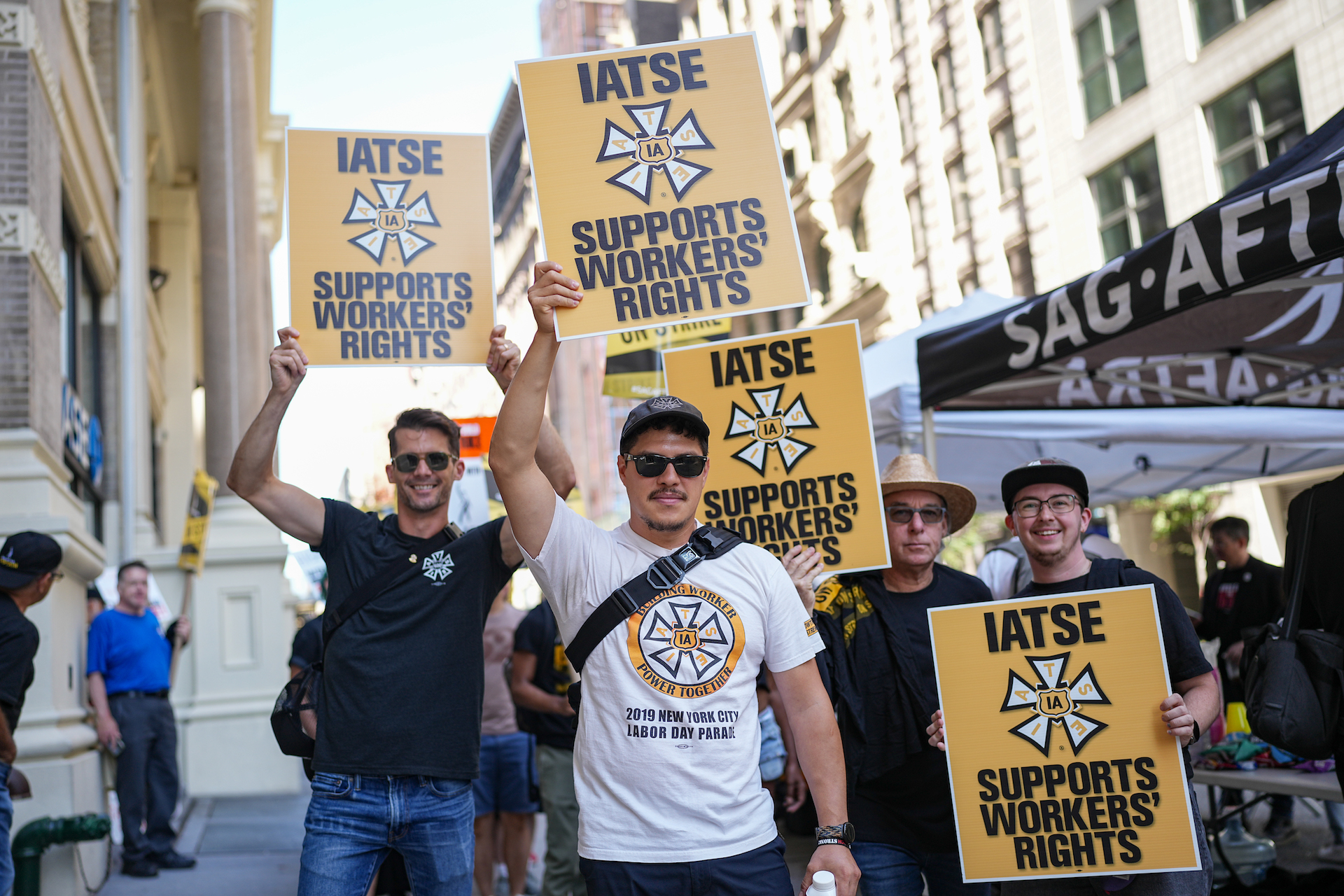IATSE, the International Alliance of Theatrical Stage Employees, announced Friday, May 17 that it has for now concluded negotiations on its Basic Agreement with the AMPTP without yet reaching a tentative agreement on a new contract.
The guild expects to resume talks for the Basic Agreement in early June and will now shift its focus to its Area Standards Agreement, which covers film and TV workers outside of Los Angeles and encompasses another 23 locals around the country. Negotiations for that contract, as previously scheduled, will begin May 20 and continue through May 31. All of this follows IATSE’s 13 individual locals each reaching a tentative deal with the AMPTP on issues specific to their locals.
IATSE’s Basic Agreement contract and the ASA do not expire until July 31, so not reaching a deal does not mean talks broke down. However, some members are demanding more transparency. Earlier this week, a group known as CREW (Caucus of Rank-and-File Entertainment Workers) launched a petition calling on IATSE to be more forthcoming about the negotiations.
At this writing, just shy of 650 IATSE members signed the petition saying they want IATSE to provide a detailed list of proposals and counterproposals throughout the remainder of the negotiation process.
IATSE has yet to release any specific terms, deal points, or highlights of its proposals, nor have locals publicly received any clarity on terms reached as part of each local’s tentative agreements. The union doesn’t intend to do so until after a tentative deal for both the BA and ASA has been reached and until a formal Memorandum of Agreement can be drawn up and sent widely to members before July 31 to vote on it. The guild has said it is not interested in extending negotiations beyond that deadline.
Since IATSE represents 170,000 people nationwide, the CREW signatories represent just .38% of its membership. CREW formed several years ago in response to the 2021 contract talks. When the Basic Agreement went up for ratification in 2021, rank-and-file members narrowly voted against it.
Members even authorized a strike that was never called, but the agreement was ratified due to an electoral college system. The ASA passed by a thin margin in the popular vote. CREW fears the same could happen again if members aren’t kept up to date and if negotiators aren’t making strong proposals on their behalf.
During their negotiations, WGA and SAG-AFTRA didn’t outline itemized lists of their proposals until it was clear each union was going on strike. However, Maggie Anne Goll, a caucus member who signed the petition and is a Local 44 member, told IndieWire that other Hollywood labor unions got to vote on a Pattern of Demands that outlined priorities before the negotiating committee went to the bargaining table. IATSE did not.

While issues like AI and wages are likely to be top of mind, some IATSE members wonder how the contract will address safety. IATSE this week notified members about the death of Rico Priem, a member of Local 80 killed in a car accident on his way home from set in the early morning hours after a 14-hour shift on the show “9-1-1.” That accident followed serious injuries sustained by Marvin Haven and other crew members after a crash on set of the Eddie Murphy movie “The Pickup” and the death of rigger JC “Spike” Osorio after he fell from a rafter on set of the Marvel series “Wonder Man.”
This year IATSE put in place “Contract Action Teams” that are meant to communicate more directly to members, especially if a strike is eventually called. However, Goll said most CAT leaders have virtually the same information as what she called the “nothing burger” notices put out by the national branch.
“It seems silly this isn’t available to at least members, not even publicly,” Goll said.
An individual with knowledge of the process told IndieWire much of the communication has been done on the local level privately between members. The Art Directors Guild, for instance, told members it was suspending its production training program, as IndieWire previously reported.
Goll said information from the various locals has been spotty. Some held substantive town halls and put together working groups; others have had little more than gossip and the understanding that they won’t get new information until the MoA is released.
“People aren’t satisfied with that,” Goll said, adding that even if a tentative deal is announced soon, CREW still intends to move forward with its petition to put pressure on IATSE leadership.
IATSE had no additional comment for this piece on CREW’s petition.
“We are working toward setting additional bargaining dates to continue to negotiate the deal our members deserve,” IATSE’s International President Matthew D. Loeb said in a statement on the negotiations. “Talks remain ongoing and we are focused on achieving the goals we came to the table with: improved wages and safer working conditions, consistent funding for our benefit plans, reasonable AI and subcontracting protections, and appropriate enhancements to our Video Tape Agreement and Side Letters.”
IATSE has previously said it needs to account for a shortfall of $670 million to keep the pension and health plans going, and that includes establishing a new streaming residual to account for the reduction in working hours. Sources have pegged estimates coming from the AMPTP as expecting working hours to reduce as much as 23 percent over the next contract term, so accounting for that difference has been the basis for talks so far.





